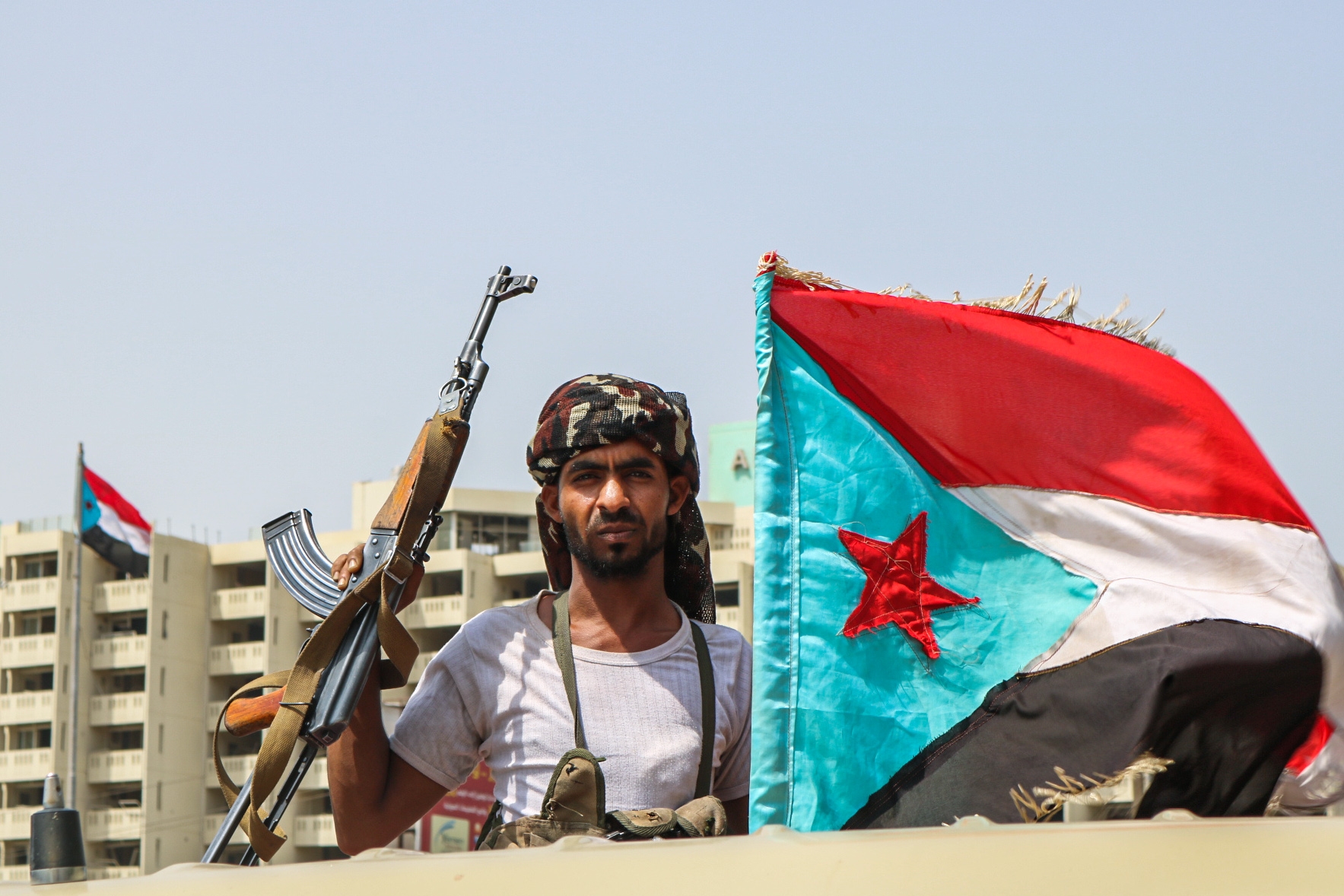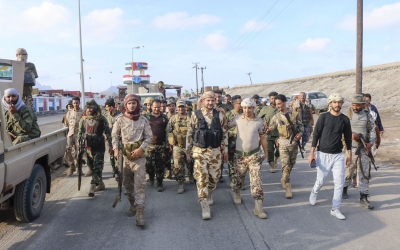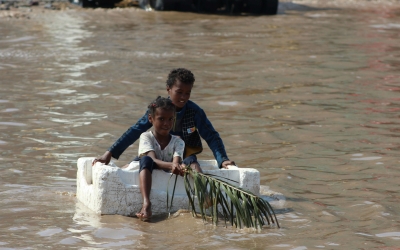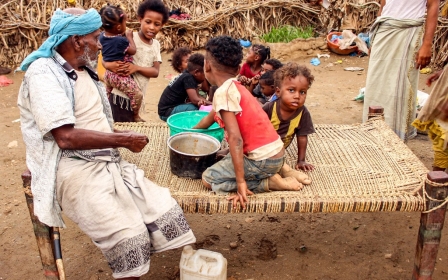Yemen's STC expected harsher Saudi and UAE response to self-rule, official says

Yemen's Southern Transitional Council (STC) expected a more forceful Saudi and Emirati rejection of its breakaway from Yemeni government rule, a spokesperson for the secessionist movement told Middle East Eye.
Last week, the STC pulled out from a power-sharing deal with the government and declared a state of emergency, saying it would take control of Aden's port and airport and other state institutions in the south such as the central bank.
New MEE newsletter: Jerusalem Dispatch
Sign up to get the latest insights and analysis on Israel-Palestine, alongside Turkey Unpacked and other MEE newsletters
In response, government-backer Saudi Arabia and STC patron the UAE urged the group to reconsider and maintain attempts to uphold the 2019 Riyadh agreement that both powers brokered to end fighting in Yemen's south.
“Frustration over delaying implementation of the agreement should not be a reason to unilaterally change the status quo,” Emirati Minister of State for Foreign Affairs Anwar Gargash wrote in a tweet.
However, many observers have noted the somewhat lukewarm response to the STC's apparent power grab, including, it seems, the Southern Transitional Council itself.
“The reactions were understandable - we expected far more reactions than that. It’s a move that can only be seen by those on the outside as being obstructive or negative,” STC spokesperson Saleh Alnoud told MEE.
But Alnoud said the move to take control over the management of governmental institutions and services in the south has been made to improve a deteriorating humanitarian situation that the government of Abd Rabbuh Mansour Hadi has not been dealing with.
Who is Yemen's Southern Transitional Council?
+ Show - HideFormation
Formed in 2017, the Southern Transitional Council is a secessionist movement focused on gaining independence for South Yemen. Comprising of 26 members, the STC includes five governors from Southern Yemen and two former government ministers.
The STC emerged after Hadi fired Aden governor Aidarus al-Zoubaidi for alleged disloyalty in April 2017.
Hadi accused Zoubaidi of prioritising the Southern Yemen independence movement over a united Yemen. Following Zoubaidi's sacking, mass rallies were held in Aden to protest Hadi's move.
The STC was subsequently created a month later, with Hadi describing the council as illegitimate.
Historical background
The call for independence has been a source of contention for over a century. South Yemen's origins can be traced back to 1874 when the British Empire created the Aden colony and Aden protectorate.
Following its independence from Britain, South Yemen was formed in 1967 and later became the People's Democratic Republic of Yemen in 1970, a Soviet Union-backed Marxist-Leninist state, the only one of its kind in the Middle East during the Cold War.
The Soviet Union's collapse led South Yemen to merge with the North to form a unified Yemen. That union, however, lasted only four years and led to the 1994 civil war, when South Yemen army units accused northern president Ali Abdullah Saleh's forces of corruption.
In 2007, the Southern Movement, also known as the al-Hirak al-Janoubi, was formed. Its stated aims were to demand equality under the law and a change in relations between north and south in the context of a united Yemen.
The Hirak was met with repression by Saleh's government. This set the foreground for the Southern independence movement to flourish during the Arab Spring after the Hirak began to champion Southern independence in 2009.
Backers
In 2016, the UAE helped create the SBF in southern Yemen. The SBF included many militants who supported a secessionist movement in Southern Yemen.
Forces within the SBF supported the STC, with the aim of establishing an independent South Yemen state. Since its formation, the SBF has played a crucial role in the Saudi-led coalition before the recent escalation.
Its successes came in part due to being militarily backed by the UAE. The backing included training of SBF fighters in Abu Dhabi and the supply of military equipment.
After receiving training, the SBF was dispatched to fight Houthi forces operating inside southern Yemen.
Emirati backing was crucial in helping the STC gain Aden, which has been under its control since 2018.
Alnoud rejected claims that the group’s unilateral move meant that the STC has stepped away from the peace deal, arguing that the agreement has yet to be implemented and the government has been uncooperative. Both sides have previously traded blame over the stalled implementation.
“We also have problems with the Saudis for not really putting their foot down to try and make real momentum on it,” he said.
The deal was reached in November to end infighting between the nominal allies, with the separatists overrunning Aden, the government’s provisional base, and key southern provinces in August.
The secessionists believe the south should be an independent state, as it was before unification in 1990.
Asked if the declaration is a step towards that goal, Alnoud said the STC is working within the context of the events in Yemen and is moving in the direction of some form of autonomy.
'We believe the STC has the overwhelming support in all those areas that have said they are against the decision'
- Saleh Alnoud, STC spokesperson
“We don’t make it a secret that people want to establish an independent state ... the STC will try to achieve the goals for the southern cause as much as possible,” he said.
“As it stands, anything other than autonomy of some sort will not be accepted by the people... They talk about unity but it’s inconceivable.”
Still, Alnoud said the council will continue to engage positively with Saudi Arabia and Hadi's government if it has the intention to execute the Riyadh agreement, even as he cast doubt on any implementation in the near future.
“We are willing to continue to work for the implementation but at the same time we not going to wait until that is finalised.”
Popular support
Despite the rejection, albeit soft, of STC’s unilateral move, the council believes that Riyadh, Abu Dhabi and the international community will get behind the separatist group once its efforts create a better situation for people in the south, according to the spokesperson.
While the STC controls Aden, Lahj and Dhalea provinces, authorities in five other southern provinces - Hadhramaut, Shabwa, al-Mahra, Abyan and Socotra - rejected the separatists claim of self-rule.
Reports of armed clashes between the STC and groups loyal to Hadi on the island of Socotra began emerging on Friday morning.
However, Alnoud brushed off the opposition from local government officials as inconsequential to the STC's decision, saying the council has already started working with administrations at a lower level and has set up a committee in Aden to deal with the needs of each province.
“People on the ground are far more important to us. We believe the STC has the overwhelming support in all those areas that have said they are against the decision,” he said.
Even though the STC has repeatedly claimed it has wide popular support across the south, residents have increasingly been voicing their anger and exasperation at both the secessionists and the government.
Severe flooding in Yemen in recent weeks has impacted around 100,000 people, with Aden especially affected. The port city now faces contaminated water, damaged roads, disrupted access to basic services and worsened electricity and water shortages.
Speaking to Middle East Eye, an Aden resident said people have had enough with empty statements and declarations from the leaderships in the south, blaming both sides for the instability they are facing.
Yemen is also bracing for a coronavirus outbreak and its collapsed healthcare system faces insurmountable challenges in a country that has suffered from a range of diseases, including cholera, and is on the brink of famine.
The STC on Wednesday declared a three-day lockdown in Aden, with a 24-hour curfew, after five Covid-19 cases in the port city were recorded, bringing the country’s total to six.
But the curfew in Aden was lifted on Thursday after many residents protested that they were not prepared for lockdown.
Middle East Eye delivers independent and unrivalled coverage and analysis of the Middle East, North Africa and beyond. To learn more about republishing this content and the associated fees, please fill out this form. More about MEE can be found here.






